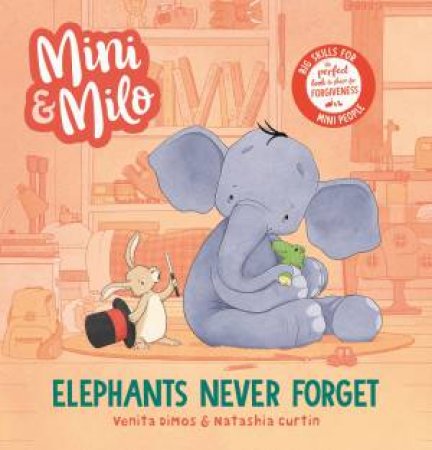Elephants never forget by Venita Dimos & Natashia Curtin

Mini the elephant has the best memory in the whole animal kingdom. She remembers the good stuff, the bad stuff and everything in between. And because Mini remembers everything, she also remembers mistakes. Usually other people's mistakes. So when her best friend Milo the rabbit accidently loses Mr Cuddles, Mini has to learn how to forgive and forget.
The tag on this book is "Big Skills for Mini People" and it is a series written for our youngest readers to not only help them manage their emotions but help them navigate their way through relationships as they venture into the world of friendships beyond family and have to learn about competitiveness, managing inner voices, learning to listen, and communicating effectively. (Others include The Teeny-Tiny Voice, Big Flappy Ears, Elephants Can't Jump, and The Last Plum. Learning to negotiate, compromise and consider others as they emerge from that egocentric world of toddlerhood can be tricky and so books like these, read with sensitive adults who can ask questions like "What could Mini have done instead of ...?" can help develop skills and strategies that will provide well for the future.
While using animals as the main characters to portray human behaviour, particularly that of young children, is a common trope in these sorts of stories, doing so enables a lot of humour and unexpectedness to be injected into the story so it doesn't become didactic and overbearing, putting something that is common for target audiences to have experienced at arm's length so they don't feel as though they are being admonished but can put themselves in the place of both characters and start to understand feelings. Did Milo mean to make Mr Cuddles vanish? How did he feel when it happened, and how did he feel when Mini got cranky? But why did Mini get so cranky? Teachers' notes for both teachers and parents can help guide the discussions further.
One for the mindfulness collection that will help young people learning about the issues associated with assuming things.
Barbara Braxton